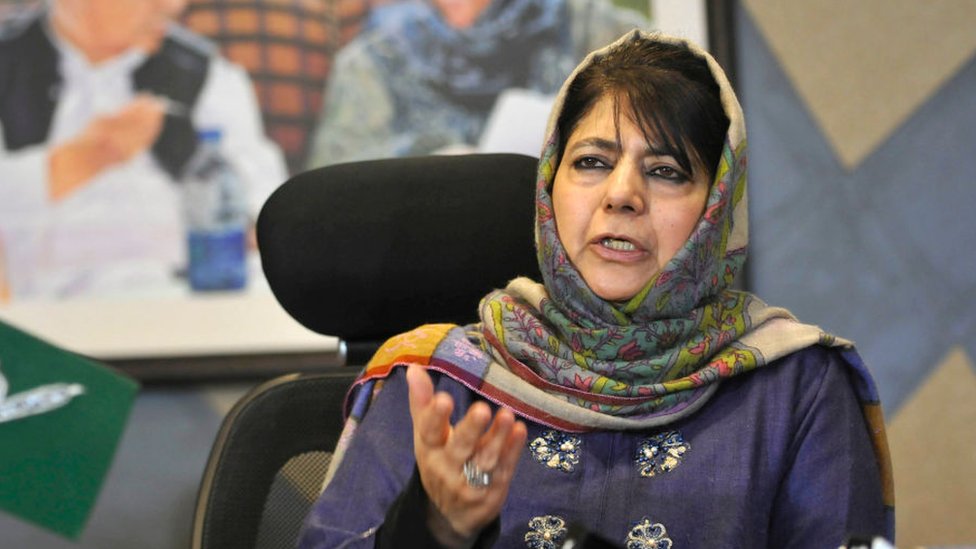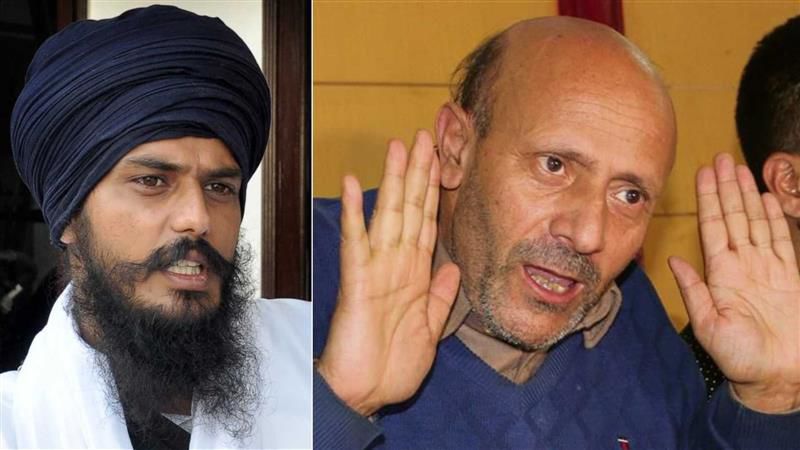Mehbooba Mufti Slams BJP’s Double Standards: ‘Why Taliban, Not Kashmiris?’ | Kashmir Politics
By: Javid Amin | 13 October 2025
A Scathing Accusation
On October 12, 2025, former Jammu & Kashmir Chief Minister and PDP president Mehbooba Mufti launched one of her most direct attacks yet on the BJP-led central government. Her statement, delivered through a post on X (formerly Twitter) and later elaborated to the media, accused New Delhi of “embracing the Taliban” while vilifying Indian Muslims through divisive narratives.
“India, the mother of democracy, is embracing the Taliban, the father of jihad, under BJP,” Mehbooba wrote.
Her comments came on the same day Afghan Foreign Minister Amir Khan Muttaqi landed in India for diplomatic talks — a move widely seen as a signal of thawing ties between the two nations.
India–Taliban Engagement vs. Domestic Policy
Mehbooba’s central argument was stark: India’s foreign policy cannot be divorced from its domestic political behavior.
While New Delhi explores avenues of engagement with the Taliban regime, which once harbored terror networks and imposed extremist rule, its approach towards Indian Muslims — especially Kashmiris — remains confrontational and exclusionary, she argued.
She highlighted how India offers scholarships to Afghan students as part of its soft diplomacy efforts, but has rolled back scholarships and welfare schemes for Indian Muslim students.
“The contradiction is glaring. You cannot embrace a regime like the Taliban abroad and treat your own Muslim citizens as suspects at home,” Mehbooba said.
Double Standards: Key Allegations
In her statement, Mehbooba outlined what she sees as a pattern of political hypocrisy:
-
Use of terms like Love Jihad, Land Jihad, Vote Jihad, and Cow Jihad to malign Indian Muslims
-
Reluctance to initiate political dialogue with Kashmiris since the abrogation of Article 370
-
Selective engagement with external actors while neglecting internal reconciliation
-
Narratives that foster polarization rather than unity
She accused the BJP of weaponizing identity politics while seeking to project India as a global democratic leader.
Political Context: A Charged Landscape
Mehbooba’s remarks land in a politically sensitive period. Jammu & Kashmir is witnessing high-stakes Rajya Sabha elections, renewed debates over statehood restoration, and shifting alliance equations.
-
Rajya Sabha Elections: The BJP is pushing aggressively to secure seats, while opposition parties including NC and Congress are battling to maintain bloc discipline.
-
Statehood Debate: Petitions seeking restoration of statehood remain pending before the Supreme Court.
-
Public Discontent: On the ground, concerns over unemployment, political alienation, and lack of dialogue continue to shape voter sentiment.
Mehbooba’s attack, therefore, is not just rhetorical — it’s a calculated political strike to position herself and PDP as a moral voice in a polarized landscape.
“If You Can Talk to Taliban, Why Not to Kashmiris?”
The heart of Mehbooba Mufti’s argument lies in this rhetorical question. She asked:
“If New Delhi can engage with the Taliban, what stops it from talking to Kashmiris?”
This line has resonated across political circles and civil society groups, reopening conversations about the absence of structured political engagement in Kashmir since 2019.
While the central government insists that development and security are its focus areas, regional parties argue that political alienation cannot be solved through administrative measures alone.
Foreign Policy Meets Internal Politics
The government’s outreach to the Taliban — including high-level diplomatic talks and soft power initiatives — has been positioned as a pragmatic strategy to protect regional interests.
But for many in Kashmir, this juxtaposition of foreign outreach and domestic silence reflects a deeper contradiction: India is willing to engage with hostile regimes abroad, yet hesitant to talk to its own people at home.
Political observers note that this duality could have long-term consequences for both India’s image and its internal stability. Diplomatic pragmatism, they argue, must not come at the cost of domestic trust-building.
Reading Between the Lines: Mehbooba’s Political Strategy
Mehbooba Mufti’s statement is part moral appeal, part political positioning. By framing the Taliban outreach as a mirror to domestic policy, she aims to:
-
Reclaim PDP’s distinct political space amid NC–Congress dominance in the INDIA bloc
-
Rally Muslim voters by highlighting issues of identity, dignity, and dialogue
-
Pressure New Delhi to restart political engagement with Kashmir’s mainstream parties
-
Reignite civil society discourse around reconciliation and trust-building
Her remarks also allow PDP to stay politically relevant in the run-up to the 2026 general elections, even with limited legislative strength.
The Kashmir Silence
Since the abrogation of Article 370, the political process in Kashmir has remained muted. Dialogue between the Centre and regional leadership has been minimal. Development projects have been highlighted, but political representation and autonomy remain unresolved issues.
Mehbooba’s critique taps into this undercurrent of frustration. Many Kashmiris express skepticism about promises of development without meaningful political empowerment.
This silence, she argues, stands in contrast to India’s loud diplomacy with external actors, including the Taliban.
Public Sentiment: A Region Watching Closely
Ground reports suggest a growing sentiment in Kashmir that New Delhi’s outreach abroad must be matched with trust at home. Key themes emerging from public opinion include:
-
Demand for dialogue and representation
-
Frustration over political marginalization
-
Skepticism towards promises without timelines
-
Concern over rising communal narratives
Mehbooba’s remarks have struck a chord with sections of youth and civil society who view political engagement as essential for long-term peace.
Historical Echoes and Future Stakes
India’s engagement with difficult regimes is not new — but the contrast with domestic policy is sharper today than ever before. The Taliban’s image as an extremist force clashes with India’s democratic ethos, making Mehbooba’s critique politically potent.
For New Delhi, the challenge is balancing strategic diplomacy with democratic credibility. For regional parties like PDP, NC, and Congress, the challenge is reclaiming political agency in a landscape dominated by administrative narratives.
Final Word: A Question That Won’t Disappear
Mehbooba Mufti’s accusation of double standards is not just about foreign policy — it is a direct challenge to the government’s narrative on democracy and inclusivity.
Her question — “Why Taliban and not Kashmiris?” — is likely to echo in the weeks ahead as political temperatures rise over Rajya Sabha elections, statehood debates, and electoral calculations.
Whether New Delhi responds with engagement or silence will shape not only Kashmir’s political future but also India’s credibility as the world’s largest democracy.



